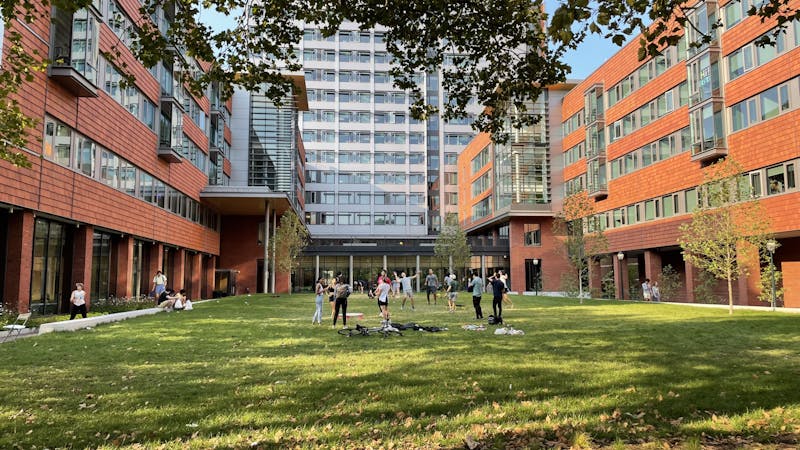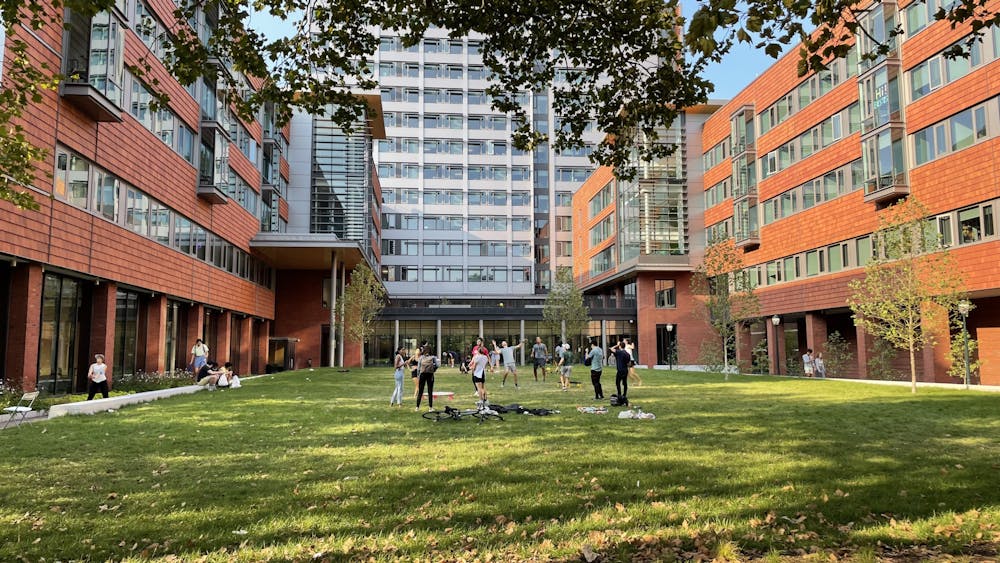Students discuss their experiences in the various summer programs Penn offers.
Credit: Gundappa Saha
Each summer, hundreds of Penn students remain on campus to participate in research programs in fields ranging from business to political science, cultural heritage, neuroscience, and more.
Penn’s summer programs — open to students from all years and schools, often regardless of prior experience — place students in labs, offices, and institutions across campus. The Daily Pennsylvanian spoke with students in six summer programs about their experiences and takeaways.
Applications for programs typically open early in the calendar year. For many students, these programs represent their first exposure to research or professional work in their field of interest.
“We believe that all students who want to do undergraduate research should be able to,” Ann Vernon-Grey — director for undergraduate research at the Center for Undergraduate Research and Fellowships — said in an interview with the DP. “You shouldn’t make the decision not to do it from a place of ignorance or fear.”
According to Vernon-Grey, summer offers a particularly valuable time for students to try a new opportunity as it is typically “a less distracted time,” allowing students to “really focus in on one thing.”
Vernon-Grey highlighted the long-term impact undergraduate experiences can have on careers, even for students not pursuing academia. She mentioned the importance of skills like “the ability to formulate and then try to answer really hard questions … to take intellectual risks … to work well as part of a team.”
“We know that employers look for the kinds of skills that you build as a researcher,” she said.
Penn Undergraduate Research Mentoring Program
For undergraduates seeking their first research experience, PURM offers a ten-week, full-time opportunity across disciplines. This year, 248 first-year and second-year students were matched with faculty mentors to work on projects culminating in a fall research exposition.
College sophomore and biology major Jailyn Cardwell is working in the Tishkoff Lab, which studies global population genetic variations. She explained that many of the diseases for which we have information are largely based on European or East Asian populations.
Her project investigates whether there is any positive selection for albinism in specific African populations. Though she had no prior coding experience, she’s now using computational tools to analyze a set of around 40 genes.
“Seeing how much I’ve learned in the last six weeks has been quite incredible,” she said. “You are learning so much, and that’s a big part of Penn. You’re always here to learn.”
Engineering junior Sid Mody and College junior Eric Cui are working in a robotics lab through PURM contributing to a project on dexterous robot manipulation.
“We give a robot any object, then we want the robot to be able to take a camera, look at an object, construct a model of the object, but then be able to manipulate it all like in real time,” Cui explained.
Mody, who studies mechanical engineering, said he “didn’t know or appreciate the software side of the world,” and he “found it interesting.”
Cui said that, as a math and computer science student, writing code with implications “in the real world” is rewarding.
Both students spent past summers in professional spheres — acknowledging the “unique” role of PURM in the world between industry and academia.
“To go from the industry experience to understanding how academia worked and the slower paced, more focused on a single question experience was interesting to me,” Mody said.
MindCORE Summer Research Fellowship
For students wanting a more interdisciplinary research experience, MindCORE offers a 10-week opportunity to explore brain science through fields such as neuroscience, computer science, psychology, and linguistics. This year’s cohort includes just over a dozen undergraduates.
Vagelos Program in the Molecular Life Sciences sophomore Jonathan Mehrotra, who is studying biochemistry and computer science, is spending his summer in the Peseran Lab. His project is “building models to predict” how brain waves correlate to common OCD symptoms.
He spends most of his time building machine learning models from EEG data under the guidance of his principle investigator, who is “super helpful and easy to approach,” Mehrotra said.
The MindCORE program supports exposure to diverse areas of cognitive science through weekly lecture lunches, which help students understand the opportunities in the field.
“When people think of the cognitive sciences, I, at least, had a pretty narrow-minded idea of what that type of research could be,” Mehrotra said.
Mehrotra explained that his experience has taught him how applicable his passions, such as computer science, are to the brain.
“It’s definitely made me re-evaluate my trajectory,” Mehrotra explained.
Penn Program on Opinion Research and Election Studies
PORES offers a 10-week, full-time research experience focused on political data, survey design, and election studies.
College junior and political science and history major Carolina Payeras is researching the relationship between race and party identification, and what changes those patterns. She has been working on “creating and fielding surveys,” and has had the opportunity to contribute to papers and articles.
“It’s been really, really great to be so involved in the process,” she said.
College senior and political science and environmental studies major Jane Kinney is working on climate politics.
She explained that her work involves researching “how businesses respond to climate risk and climate regulations,” as well as analyzing the impacts of the “Inflation Reduction Act on voting patterns.” Her tasks include compiling an extensive literature review and building a dataset.
Both students emphasized the value of PORES’ professional development programming, which includes guest speakers every Monday and Thursday. Payeras said that experts come from “different perspectives of using data science.”
“It’s been really cool to see what you can do with the experience and the education you’re getting from PORES,” she added.
Though PORES is largely coding-focused, Kinney said that “it’s not just data people.”
The program also maintains a close relationship with NBC’s Decision Desk — with Kinney spotlighting a lunch students had with NBC staff.
Payeras said the most rewarding part has been “getting to be super involved with such high-level work … and getting to work with such amazing Penn professors.”
Summer Humanities Internship Program
SHIP places Penn students in 10-week, full-time positions at cultural and public service institutions across Philadelphia, including the Penn Museum, the National Constitution Center, Historic Germantown, and the University Art Collection.
Sierra Williams, a College junior and cultural and linguistic anthropology and linguistics major, is interning at the Penn Cultural Heritage Center. Her work supports the Missions and Acquisitions project, which tracks ethical collection and provenance practices across museums. One of her main roles is to organize and add to spreadsheets from previous years, researching “museums and … their acquisitions, and whether that information is readily available online.”
Beyond her day-to-day research, Williams participates in weekly museum programming. Each Wednesday, interns attend museum training sessions led by staff and faculty, and on Thursdays, they take field trips to museums and public service organizations across the city.
“Just making sure that we give back to the communities that we are teaching the public about has been really cool,” she said.
College sophomore and art history major Nina Mayers is interning with the University Art Collection. With a team of just two full-time staff, she is involved in everything from cataloging and photography to art installation.
“A lot of my job is doing the annual art inventory,” she said — involving thousands of pieces of art, many of which are located around campus. Mayers recently assisted in conservation efforts for works affected by mold and has shadowed meetings with structural engineers and conservators.
This summer has reinforced Mayers’ goal of becoming an art conservator.
“The way that people talk about art, the way that people interact with it, has really cemented the way I want to work with art,” she said.
Mayers added that working closely with her mentors has helped her build valuable connections in the field, especially as “the art world is so hard to break into.”
Penn Sustainability Office Interns
Each summer, Penn Sustainability hosts a cohort of undergraduate and graduate interns working on environmental data, education, and operations.
Second-year master’s student in environmental studies Jason Klein is serving as the data and strategic waste intern. Much of his work centers on “Trash Talk,” a new waste education module he helped script and produce for first-year student orientation. The project builds on a waste audit initiative he worked on during a class, which inspired Penn Sustainability to continue the idea and develop a full Canvas module.
“It’s really cool to have a position where it’s a continuation of something you’ve already worked on,” he said.
Klein is also conducting a comparative analysis of Penn’s past Sustainability Tracking, Assessment and Rating System reports. His task is to identify trends and recommend improvements to help Penn move from a gold to a platinum rating — which he said has made him even more “interested in the importance of data in sustainability.”
Yimi Shao, another second-year student in the MES program, is working as the transportation intern. Her work spans several major projects, including updating the campus vehicle fleet inventory and analyzing Penn’s application for the Bicycle Friendly University Award.
She explained that she is “doing a gap analysis to see how [Penn] can improve our campus bicycle commuting,” as Penn currently holds a silver award. Shao also supports university-wide sustainability reporting, which involves reviewing federal policy changes and ensuring Penn’s documentation is up to date.
Shao mentioned her interest in the role due to a connection with her academic capstone project about “site selection of the EV charging stations in Philadelphia.”
Klein said the most rewarding part is knowing that “the things I’m working on are able to be utilized by anyone to help improve their lives as well as the community at Penn.”
Penn Office of Investments Interns
The Penn Office of Investments manages the University’s $23 billion endowment, supporting costs such as research, student aid, and healthcare.
This summer, Wharton junior Grace Hu is interning with the office, joining a small cohort of undergraduates.
Hu works full-time supporting research, note-taking, and meetings with fund managers, with her current projects focused on the real estate sector.
“A big part of what we do is … we invest in people,” she said.
She added that the work involves “relationship management” and “people skills.”
The mission-driven culture has stood out to her. With a small team — many of whom are Penn alumni — the office supports close mentorship of interns and a shared commitment to the University.
Sign up for our newsletter
Get our newsletter, DP Daybreak, delivered to your inbox every weekday morning.
“Everyone is very self-motivated, and … they choose to work at Penn because they really care about the school,” she added.
Hu has also “grown to appreciate Philly a lot more.”
“Make the most of the city,” she advised. “A big part is your internship, but another big part is the little fun memories you can get from summer.”
The Daily Pennsylvanian is an independent, student-run newspaper. Please consider making a donation to support the coverage that shapes the University. Your generosity ensures a future of strong journalism at Penn.

